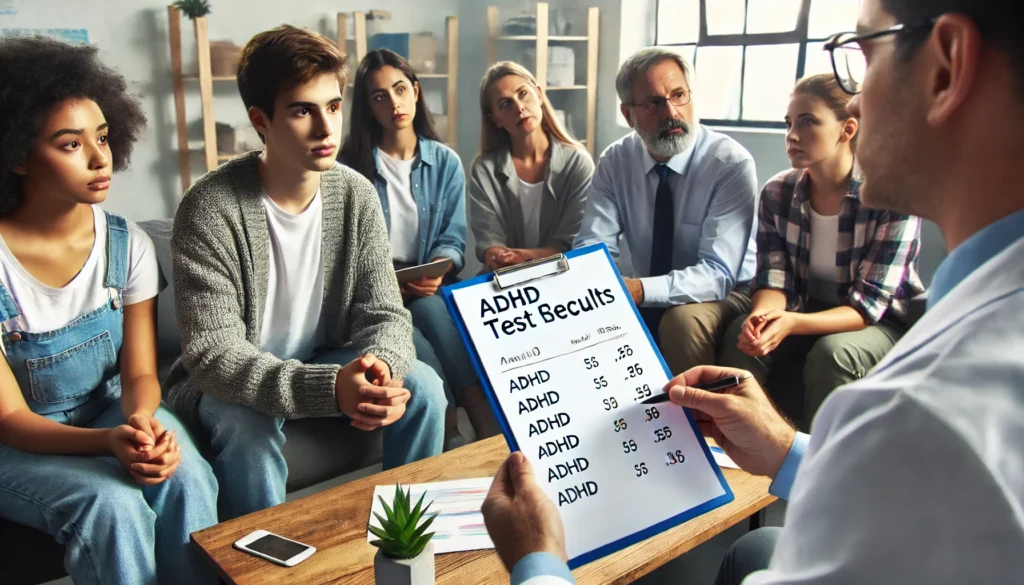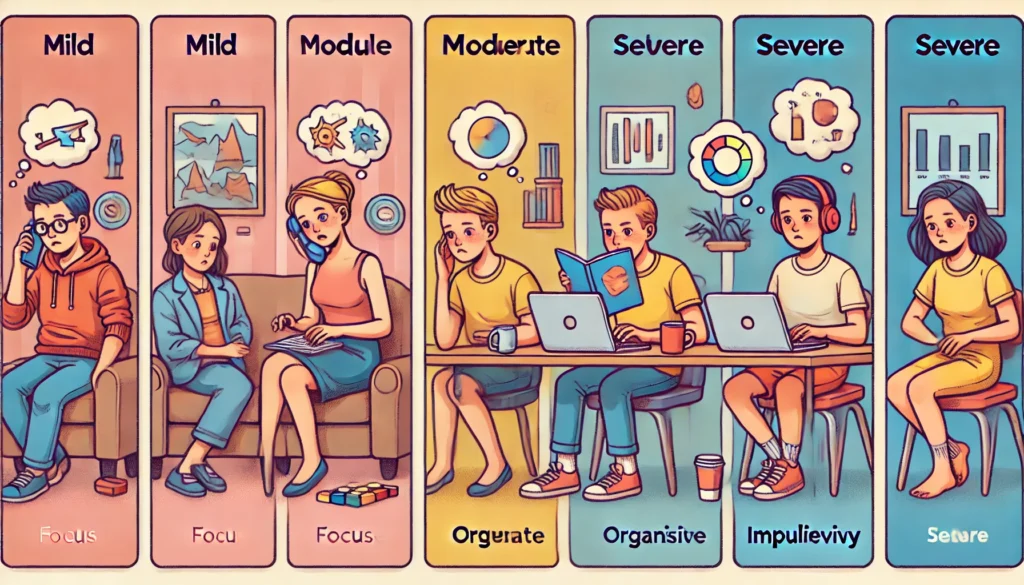Attention Deficit Hyperactivity Disorder (ADHD) is a neurodevelopmental disorder characterized by symptoms of inattention, hyperactivity, and impulsivity. Though often diagnosed in childhood, ADHD can persist into adulthood, affecting personal, academic, and professional aspects of life.
You may also like: Enhancing Concentration: Strategies for ADHD
Historical Context
ADHD’s recognition as a medical condition has evolved over the past century. Initially termed “hyperkinetic impulse disorder,” our understanding of ADHD has expanded with advances in neuroimaging and neuropsychology. This historical backdrop is essential for appreciating the complexities and nuances of ADHD assessments today.
Early Medical Perspectives
In the early 20th century, ADHD was largely misunderstood and often misdiagnosed. The medical community’s initial interpretations were simplistic, focusing primarily on hyperactivity without acknowledging the broader spectrum of symptoms.
Evolution of Diagnostic Criteria
Over the decades, diagnostic criteria for ADHD have undergone significant revisions. Influential organizations like the American Psychiatric Association have played a pivotal role in refining these criteria, ensuring they reflect the disorder’s multifaceted nature.
Impact of Technology on Understanding
Advancements in technology, particularly in neuroimaging, have provided profound insights into ADHD. These tools have revealed structural and functional brain differences in individuals with ADHD, deepening our understanding and shaping modern diagnostic approaches.
Prevalence and Demographics
ADHD is one of the most common neurodevelopmental disorders. Its prevalence varies across different populations, influenced by factors like genetics, environment, and socio-economic status.
Age and Gender Variations
While ADHD is frequently diagnosed in children, it is increasingly recognized in adults. Gender differences also exist, with boys more often diagnosed in childhood, though research suggests girls may be underdiagnosed due to differing symptom presentations.
Geographical Differences
The prevalence of ADHD can vary significantly between countries and regions. These variations may be due to differences in diagnostic practices, cultural perceptions, and healthcare access.
Socio-Economic Influences
Socio-economic factors can impact both the diagnosis and management of ADHD. Access to healthcare resources, educational support, and societal attitudes towards mental health can influence outcomes for individuals with ADHD.
Symptoms and Behavioral Patterns
ADHD encompasses a wide range of symptoms that can manifest differently in each individual. Understanding these patterns is crucial for accurate diagnosis and effective management.
Inattention Symptoms
Inattention in ADHD can present as difficulty sustaining focus, frequent careless mistakes, and challenges with organizing tasks. These symptoms can significantly impact academic and occupational performance.
Hyperactivity and Impulsivity
Hyperactivity and impulsivity are hallmark symptoms of ADHD. They can manifest as restlessness, difficulty remaining seated, interrupting others, and acting without consideration of consequences.
Emotional Dysregulation
While not a core symptom, emotional dysregulation is often associated with ADHD. Individuals may experience intense emotional responses and difficulty managing frustration, which can affect interpersonal relationships.

The ADHD Test: Understanding the Basics
ADHD testing typically involves a combination of behavioral assessments, clinical interviews, and standardized rating scales. These tests are designed to evaluate the presence and severity of ADHD symptoms.
The Role of Rating Scales
Rating scales such as the Conners’ Rating Scale and the ADHD Rating Scale-IV are commonly used tools. They serve to quantify symptoms and provide a structured method for evaluating behaviors across different settings.
Commonly Used Rating Scales
Various rating scales are available to assess ADHD symptoms. Each scale has its own strengths and is selected based on the specific needs of the assessment, providing a comprehensive picture of symptomatology.
How Rating Scales Are Administered
Rating scales can be completed by the individual, parents, teachers, or clinicians. The setting and method of administration can influence the results, highlighting the importance of a multi-informant approach.
Interpreting Scale Results
Interpreting the results from rating scales requires expertise. Scores must be considered in the context of normative data and clinical judgment to determine the presence and severity of ADHD symptoms.
Interpreting ADHD Test Scores
Your ADHD test score is a numerical representation of the severity of symptoms you experience. It is vital to understand what these scores mean in the context of ADHD severity scales.
The Meaning Behind the Numbers
ADHD test scores are not standalone diagnoses but indicators of symptom severity. Understanding how these numbers translate into real-life experiences is crucial for effective management.
Contextual Factors in Interpretation
Scores must be interpreted in conjunction with other clinical data. Factors like age, co-occurring conditions, and environmental influences play a significant role in the accurate interpretation of results.
Communicating Results to Patients
Conveying ADHD test results to patients requires sensitivity and clarity. It’s essential to explain what the scores mean in practical terms, focusing on how they relate to daily challenges and potential interventions.

What Does Your ADHD Test Score Mean?
ADHD test scores help categorize the level of symptoms into mild, moderate, or severe. Understanding these categories can guide treatment plans and coping strategies.
Mild ADHD
A score indicating mild ADHD suggests that symptoms may be present but do not significantly impair daily functioning. Individuals with mild ADHD might experience occasional difficulties with focus or impulsivity but can typically manage these challenges with minimal intervention.
Living with Mild ADHD
While mild ADHD may not heavily impact daily life, it can still pose challenges in certain situations. Understanding these nuances allows individuals to develop targeted strategies to enhance focus and productivity.
Minimal Intervention Strategies
For those with mild ADHD, lifestyle changes and organizational strategies can be effective. Techniques such as time management, setting reminders, and minimizing distractions can help manage symptoms.
When to Seek Further Support
Even with mild ADHD, there may be times when symptoms become overwhelming. Recognizing when to seek professional guidance is crucial for maintaining well-being and preventing escalation.
Moderate ADHD
Moderate ADHD scores indicate a more noticeable impact on daily activities. Individuals may struggle with organization, time management, or maintaining attention in various settings. At this level, structured behavioral interventions or medication may be recommended to manage symptoms effectively.
Challenges of Moderate ADHD
Moderate ADHD can affect multiple areas of life, from education to personal relationships. Understanding the breadth of these challenges is key to developing comprehensive management plans.
Behavioral Interventions
Structured interventions, such as cognitive-behavioral therapy, can be highly effective for moderate ADHD. These approaches focus on modifying behavior patterns and developing skills to cope with symptoms.
Medication Considerations
Medication may be considered for moderate ADHD, either alone or in combination with behavioral strategies. Collaborating with healthcare providers ensures a balanced approach that addresses both symptoms and individual preferences.
Severe ADHD
A severe ADHD score reflects a substantial impact on an individual’s life. Symptoms are pervasive and interfere significantly with social, academic, or occupational functioning. Comprehensive treatment, often involving a combination of medication, behavioral therapy, and lifestyle adjustments, is typically necessary.
Life with Severe ADHD
Severe ADHD can pose significant challenges, affecting every aspect of life. Individuals may struggle with maintaining employment, relationships, and overall quality of life, necessitating robust support systems.
Comprehensive Treatment Plans
Effective management of severe ADHD typically requires a multidisciplinary approach. Combining medication, therapy, and lifestyle changes can address the wide range of symptoms and their impact on daily functioning.
The Role of Continuous Monitoring
For individuals with severe ADHD, ongoing assessment and adjustment of treatment plans are essential. Regular monitoring allows for timely interventions and adaptations to ensure optimal management.
Current Trends in ADHD Diagnosis and Management
The landscape of ADHD diagnosis and treatment is continually evolving, influenced by emerging research and societal attitudes toward mental health.
Advances in Diagnostic Tools
Recent advancements in neuroimaging and genetic research are providing new insights into the biological underpinnings of ADHD. These developments hold promise for more personalized and accurate diagnostic approaches in the future.
Neuroimaging Breakthroughs
Innovations in neuroimaging are offering unprecedented views into the ADHD brain. These insights are helping to refine diagnostic criteria and tailor interventions to individual needs.
Genetic Research Contributions
Genetic studies are uncovering the hereditary components of ADHD. Understanding these genetic links can lead to more targeted therapies and preventive measures for at-risk populations.
Integration of Technology in Diagnostics
The integration of technology, such as digital assessments and AI, is revolutionizing ADHD diagnostics. These tools offer the potential for more precise and accessible evaluations, benefiting individuals worldwide.
Holistic Management Approaches
Beyond medication, there is an increasing focus on holistic management strategies for ADHD. These include dietary modifications, exercise, mindfulness practices, and cognitive behavioral therapy (CBT). Such approaches aim to address the multifaceted nature of ADHD symptoms.
Dietary and Nutritional Interventions
Emerging research suggests that diet and nutrition can influence ADHD symptoms. Identifying and incorporating beneficial dietary changes can support overall health and symptom management.
The Impact of Physical Activity
Regular physical activity is increasingly recognized as a valuable component of ADHD management. Exercise can improve mood, focus, and overall cognitive function, complementing other treatment strategies.
Mindfulness and CBT
Mindfulness practices and cognitive-behavioral therapy are gaining traction as effective ADHD interventions. These approaches focus on developing awareness, self-regulation, and coping skills, enhancing quality of life.
Societal Attitudes and Awareness
Societal attitudes towards ADHD are shifting, influenced by increased awareness and advocacy. These changes are fostering a more supportive environment for individuals with ADHD.
The Role of Advocacy Groups
Advocacy groups play a critical role in promoting ADHD awareness and support. Their efforts contribute to policy changes, increased funding for research, and improved public understanding of ADHD.
Changing Perceptions in Education
Educational systems are adapting to better accommodate students with ADHD. Implementing individualized education plans and support services is helping to level the playing field for these students.
Workplace Accommodations and Support
Workplaces are beginning to recognize the importance of accommodating employees with ADHD. Implementing supportive measures can enhance productivity and job satisfaction for these individuals.
Practical Advice for Navigating Your ADHD Diagnosis
Understanding your ADHD test score is just the beginning. Here are some practical steps to consider:
Building a Support Network
A robust support network, including healthcare professionals, family, and support groups, can provide invaluable assistance in managing ADHD. Open communication with these individuals about your symptoms and challenges is crucial.
The Importance of Family Support
Family members can offer emotional support and practical assistance. Encouraging open dialogue about ADHD can strengthen relationships and improve understanding of the challenges involved.
Professional Guidance and Resources
Engaging with healthcare professionals who specialize in ADHD can provide tailored advice and treatment options. They can guide you through the complexities of your diagnosis and management plan.
Peer Support and Community Groups
Joining ADHD support groups can connect you with others who share similar experiences. These communities offer a platform for sharing advice, strategies, and encouragement.
Implementing Structured Routines
Establishing structured daily routines can help mitigate the impact of ADHD symptoms. This includes setting specific times for tasks, using organizational tools, and breaking tasks into manageable steps.
Creating a Daily Schedule
Developing a consistent daily schedule can enhance focus and productivity. Prioritizing tasks and setting clear goals ensures that important activities are completed efficiently.
Utilizing Organizational Tools
Tools such as planners, apps, and timers can assist in managing time and responsibilities. These resources help keep track of tasks and deadlines, reducing the likelihood of oversight.
Adapting Routines as Needed
Flexibility is key when implementing routines. Adjusting schedules and strategies in response to changing circumstances ensures they remain effective and supportive of individual needs.
Exploring Treatment Options
Consider all available treatment options, from medication to alternative therapies. Collaborate with healthcare providers to develop a personalized plan that addresses your unique needs and preferences.
Assessing Medication Benefits and Risks
Evaluating the potential benefits and side effects of medication is crucial. Working with a healthcare provider can help determine the most appropriate options for your specific symptoms and lifestyle.
Alternative and Complementary Therapies
Exploring complementary therapies, such as acupuncture or yoga, may offer additional symptom relief. These approaches can be integrated into a broader management plan to enhance overall well-being.
Personalizing Your Treatment Plan
Treatment plans should be tailored to individual preferences and needs. Regularly reviewing and adjusting these plans with healthcare providers ensures they continue to meet evolving circumstances.

Future Implications and Research Directions
As research into ADHD continues to advance, we anticipate further breakthroughs in understanding and treating this complex disorder. Emerging technologies and novel therapeutic approaches hold promise for enhancing the quality of life for those affected by ADHD.
Emphasizing Neurodiversity
The growing recognition of neurodiversity is reshaping how society views and accommodates individuals with ADHD. Emphasizing strengths, rather than focusing solely on deficits, can foster a more inclusive and supportive environment.
Celebrating Individual Strengths
Recognizing the unique strengths and talents of individuals with ADHD is essential. Focusing on positive attributes encourages self-esteem and empowers individuals to pursue their goals.
Neurodiversity in Education and Employment
Embracing neurodiversity in educational and workplace settings can lead to more inclusive practices. Tailoring environments to accommodate diverse needs fosters creativity and innovation.
Societal Benefits of Neurodiversity
Societal acceptance of neurodiversity can lead to broader cultural shifts. Valuing different ways of thinking enriches communities and promotes a more harmonious coexistence.
Emerging Therapeutic Technologies
Advancements in technology are paving the way for innovative ADHD treatments. These developments offer new possibilities for symptom management and support.
The Role of Digital Therapeutics
Digital therapeutics, such as apps and online programs, are gaining traction as ADHD interventions. These tools offer accessible and engaging ways to support symptom management.
Virtual Reality in Treatment
Virtual reality is being explored as a therapeutic tool for ADHD. Its immersive nature can aid in developing focus, social skills, and emotional regulation in a controlled setting.
Personalized Medicine Approaches
Advances in personalized medicine hold promise for more targeted ADHD treatments. Tailoring interventions based on genetic, environmental, and lifestyle factors can enhance efficacy and reduce side effects.
The Future of ADHD Research
Ongoing research is vital for advancing our understanding of ADHD. Continued exploration of genetic, environmental, and neurological factors will pave the way for new interventions and support strategies.
Collaborative Research Initiatives
Collaborative research efforts are essential for driving progress. Bringing together experts from various fields facilitates comprehensive studies and innovative solutions.
Longitudinal Studies and Insights
Longitudinal studies provide valuable insights into the long-term effects of ADHD and its treatments. Understanding these trajectories can inform early interventions and improve outcomes.
Funding and Policy Support
Adequate funding and supportive policies are crucial for advancing ADHD research. Advocacy for increased resources ensures continued progress in understanding and managing this complex disorder.
Conclusion
Your ADHD test score is a valuable tool in understanding your unique cognitive profile. By comprehending what your score indicates, you can take informed steps toward managing symptoms and improving overall well-being. Remember, ADHD is just one aspect of who you are, and with the right resources and support, you can navigate its challenges and harness its potential.
In your journey, stay informed, seek support, and explore the myriad of options available to enhance your mental and physical health. ADHD is a part of your story, but it does not define you. Embrace your individuality, leverage your strengths, and pursue a fulfilling life with confidence and resilience.
Further Reading:
Evaluation of the ADHD rating scale in youth with autism
Conners Scale for ADHD Assessment
Strengths and Weaknesses of the ADHD Symptoms and Normal Behavior Scale (SWAN)
Important Note: The information contained in this article is for general informational purposes only, and should not be construed as health or medical advice, nor is it intended to diagnose, prevent, treat, or cure any disease or health condition. Before embarking on any diet, fitness regimen, or program of nutritional supplementation, it is advisable to consult your healthcare professional in order to determine its safety and probable efficacy in terms of your individual state of health.
Regarding Nutritional Supplements Or Other Non-Prescription Health Products: If any nutritional supplements or other non-prescription health products are mentioned in the foregoing article, any claims or statements made about them have not been evaluated by the U.S. Food and Drug Administration, and such nutritional supplements or other health products are not intended to diagnose, treat, cure, or prevent any disease.


